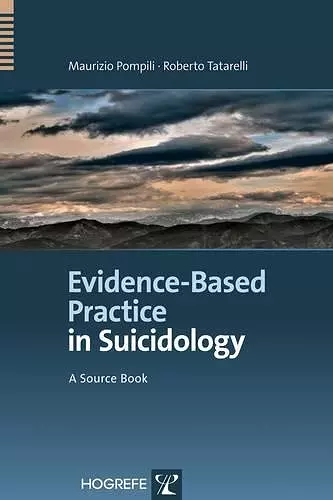Evidence-Based Practice in Suicidology
A Source Book
Maurizio Pompili editor Roberto Tatarelli editor
Format:Hardback
Publisher:Hogrefe Publishing
Published:24th Dec '10
Currently unavailable, and unfortunately no date known when it will be back

Suicide rates have increased by 60 per cent worldwide in the past 45 years, with deaths by suicide projected to reach 1.5 million by the year 2020. Despite millions being spent on suicide prevention activities, little is known about their effectiveness: as the US Suicide Prevention Action Network (SPAN) reported, 'the single greatest obstacle to the effective prevention of suicide is the lack of evaluation research'. Evidence-based medicine involves the conscientious, explicit, and judicious use of current best evidence in making decisions about the care of individual patients - which means integrating individual clinical expertise with the best available external clinical evidence from systematic research. This substantive and authoritative volume shows for the first time how evidence-based approaches can be used in suicide prevention - as well as where evidence is lacking and how we might obtain it. Leading researchers and practitioners describe what really works in suicide prevention, the evidence for and against particular approaches, both in general terms (such as by means of hotlines, restriction of means, psychopharmocology) and for specific disorders (such as schizophrenia, personality disorder), and make specific recommendations about where we go from here.
"Among the few [books] in the field that is able to provide a useful perspective bridging the gap between clinical practice and research findings on suicide prevention / postvention. [...] [It] provides clarity to the complex clinical and research issues related to suicidology. Given the diverse cultural and professional backgrounds of the contributors, the text is exceptionally coherent with individual chapters that are magically woven around the core framework. [...] It could well be a starting text for practitioners or researchers exploring the field. For sophisticated researchers it is a good summary on cutting-edge science in this area and may inspire future research directions. The scientific language used throughout the chapters is equally comprehensible, and therefore suitable to multidisciplinary professionals." Sandra Chan, MRCPsych, FHKAM (Psychiatry), The Chinese University of Hong Kong, in East Asian Arch Psychiatry, Vol. 21, 2011 "[...] evidence-based guidelines for evaluation of risk for self-inflicted death and institutional, professional, and community strategies for risk reduction are provided. [...] This book summarizes what we know and what we need to explore to know better how to help our patients and their families. It should be read by heath professionals, educators, and community leaders working with populations at risk to reduce the tragedy of life lost by suicide."Andrew E. Slaby, M.D., Ph.D. in Psychiatric Services,Vol. 63 (2012) [...] "Evidence-Based Practice in Suicidology demonstrates very succinctly how scientific evidence can be translated directly into practical clinical decision making.[...] Critically, most of the conclusions presented in the text are supported by brief descriptions of the highest quality studies, and in many cases contributors present inferential data to better clarify or highlight the main points. This critical appraisal of the scientific literature is a definite strength that goes beyond the typical narrative style of most books." Craig J. Bryan in PsycCRITIQUES, Vol. 56, Nov. 2011 "This is an excellent and needed approach to suicidology. It gathers the world's leading experts in evidence-based treatment and research in this area and gives them a singular, central forum to present their ideas. The book is both informative and clearly written. It includes practical applications from the research that can be implemented immediately to help prevent suicide in general, as well as specific information for different disorders/illnesses. I would highly recommend this book to anyone who has the need to understand suicide and its prevention." Brett C. Plyler, M.D., Northwestern Memorial Hospital "This is the book we have all been waiting for. It provides answers to the key questions in suicidology: What is our evidence-base? And how can we translate research findings into effective suicide prevention interventions and practices? The expert contributors bring clarity into the field, describing the current research evidence as well as showing us how to interpret it and apply it in clinical and prevention settings. This book brings suicidology into the 21st century and also sets an agenda for its future directions. It is a must-read for everyone concerned with helping individuals at risk of suicidal behaviors." Morton M. Silverman, MD, Senior Advisor, Suicide Prevention Resource Center, Newton, MA, Senior Medical Advisor, The Jed Foundation, New York, NY, Assistant Clinical Professor of Psychiatry, University of Colorado at Denver, Denver, CO "Evidence-based methods have, over recent decades, enabled us to prune the vineyard of suicidology. Read this book to see how the field looks today, trimmed back and flourishing as never before. It will show you much of what we know (and what we don't know) about suicide, and take you to the cutting edge." John T. Maltsberger, MD, Associate Clinical Professor of Psychiatry, Harvard Medical School, Boston, MA
ISBN: 9780889373839
Dimensions: unknown
Weight: unknown
364 pages